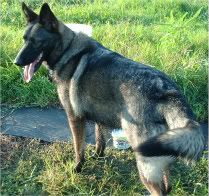I've been lurking in the background. I agree with all of the commentary.
As I understand it, you have a 5 month old puppy, a shepherding breed, and there are puppy rebellions and attitudes you are dealing with.
I suppose my vision of the world has to do with creating a relationship that establishes a hierarchy from the start. People first, dog second, etc.
I would work to discourage a dog growling at me if I woke it up. After all, I provide it a place to sleep, on my mat, in my house, etc. A growl is not a outward and visible sign that the dog understands its place in my pack, and it is my responsibility to have it understand so.
If I pick up a lead and the dog growls, similarly I would take a dim view of the growl. There is no equality of place in my pack.
In so far as the dog is proximate all the time, you have the opportunities, at random, to initiate all kinds of brief reinforcing training. The random come, sit, down just to do it. Everything randomly designed to remind the dog of its role in the home. Don't have to be mean but you do have to train with a constant sense of purpose and demeanor. And this approach to formal training sessions.
You have to practice a no nonsense tone of voice that the puppy understands to be the non negotiable tone of voice. Good behavior a more accepting tone, bad behavior the no nonsense tone of voice. I'm a fan of treats and immediate praise for good action, and body language disdain and attitude for bad action.
Left to its own devices, from what I know of shepherd breeds, it will organize the herd. It will lead.
I think I'd have a lead on the puppy all of the time, in the house and outside. I'd get a really long line for outside and we'd probably work on any leash attitude as a specific training objective.
I don't believe in yanking a dog all over the place but there are some behaviors I have zero tolerance for, growling at me would be at the top of the list. Snapping at me would be at the top of the list and correction of some sort would be immediately appropriate in my world.
The puppy has been in your home long enough to have made the transition from litter to you. That is a human consideration that can be over done. It is a part of your home and that is that.
5 months. Two steps forward, one step back. Teaching a 3 year old child takes time and patience. Learned behavior is still in some flux. Expectations need to be adjusted. However some behavior needs to be addressed in a gentle but no compromise manner. Nipping, biting, growling, ignoring, etc. Not acceptable behavior. Compliance gets rewarded, non compliance gets addressed.
I presume you want the dog to be a pet. Decide now to train the dog to become a pet. Set limits, consistently, and reward or correct as the limits dictate. You can love your puppy without liking bad behavior.
You should invest in a drop dead word. What word would you use to immediately refocus the dog on you? For me it is the word Hey with a no nonsense look on my face and matching body language. And then a command. I do not negotiate with dogs. And a puppy can train an otherwise organized adult human to negotiate out of cuteness.
You train with authority and consistency today for the dog you want tomorrow. After all, who wants a puppy for 12 or more years? Not I. And I think puppies are cute.
Marker training is a great technique. But you have to be an actor with any training technique. The dog needs to understand your attitude with a look, in my opinion.
The dog is on your agenda, you are not on its.
But a puppy is a puppy is a puppy. Some are easier and some more difficult but it does takes a lot more to train out bad traits in an older dog than it does to train in good ones in a younger one, in my opinion.
Stand your ground. Set the objectives. Reinforce limits. Profusely immediately praise. Immediately correct. Smiles and frowns. Act like a leader all of the time. You can learn a lot about yourself as you train your dog.
More coffee.
Mike A.
"I wouldn't touch that dog, son. He don't take to pettin." Hondo, played by John Wayne Previous Topic
Previous Topic Index
Index Next Topic
Next Topic












 Top
Top








.jpg)